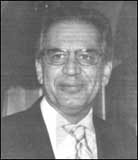 Just a few days into his new job, Pakistan's Commerce Secretary Syed Asif Shah reiterates the view that trade can only proceed as well as political relations between India and Pakistan. Excerpts from an interview with Monica Gupta:
Just a few days into his new job, Pakistan's Commerce Secretary Syed Asif Shah reiterates the view that trade can only proceed as well as political relations between India and Pakistan. Excerpts from an interview with Monica Gupta:
How were the talks? Are you happy with the progress?
This was the second round of talks on economic and commercial cooperation within the composite dialogue. We usually exchange an agenda before such talks. This time there were four items on the agenda, which included trade in goods, transit route, services (namely, air, shipping and financial services) and a road-map for the joint study groups.
Both sides decided that we need to modify the air services agreement of 1976. We have sought more destinations and more flights on a reciprocal basis. Next month, experts from both sides will talk on this. It was also felt that the shipping protocol was redundant and has to be reviewed totally. Since the volume of trade is increasing, we can no longer have a situation where only Pakistani ships are allowed to pick up Pakistani goods from Indian ports and vice versa.
What is the progress made on financial services?
Both sides have agreed to expedite the process of allowing branches of scheduled banks to be opened in each other's country. Two banks from Pakistan, namely Bank of Punjab and Habib Bank have applied to the Reserve Bank of India for permission to open up branches. Similarly, State Bank of India has sought a licence to open branches in Pakistan.
The MoU signed between the Securities and Exchange Board of India and the Securities and Exchange Commission of Pakistan would help us to learn from Sebi's experience as a regulator since it is a much older organisation.
Is there a possibility of Pakistan disbanding the positive list and having a negative list of Indian exports instead?
The positive list has been constantly expanding. We have around 771 items and we added over 78 recently. But we have to keep objective realities in mind as talks between Pakistan-India is not just trade and commerce but also the geo-strategies. Trade has to be a part of the composite dialogue.
If political relations and the security situation improve, if there is movement forward on the issue of Kashmir, trade will automatically pick up. Even now, the items allowed from India constitute around 45 per cent of our total tariff lines.
Why is Pakistan opposed to making the Attari and Wagah land route permanent as demanded by India?
We are not ready right now as our infrastructure is not geared up for that. Allowing trade on a permanent basis would require us to put in place some procedures, infrastructure including upstream and downstream rail links. We have recently allowed imports of some items and live animals from Wagah. It is in the interest of both countries to do it in this manner.
Even regarding transit, there is no change in our present position to allow transit only through the Karachi and Kasim Port. Extending this facility to Wagah would require us to step up infrastructure in customs clearances.
Why is Pakistan not allowing exports of diesel from India?
We do not have the mandate to take this decision. Your petroleum minister had recently visited Pakistan and discussed the issue with the officials concerned. He also met our President and Prime Minister. They are aware of this issue but have not taken a decision so far.
What about granting Most Favoured Nation status to India?
I have read in the newspapers here that your own commerce secretary has said that it is a non-issue. The Indian side did not raise this issue during the talks here.
Your granting an MFN will become redundant after South Asian Free Trade Agreement.
Once operational, SAFTA will reduce tariffs all round in a phased manner by 2013 to between 0 and 5 per cent. Also, the least developed countries in the group like Bangladesh, Nepal and Bhutan would be given more time to reduce tariffs while the non-LDCs like India and Pakistan would reduce tariffs earlier.
There are likely to be some teething problems particularly with regard to the "rules of origin" or the sensitive list. But I believe that our traders are nimble and trade will increase once the understanding about each other's trade regime increases [under SAFTA].
What is the agreed road-map of the Joint Study Group?
We have agreed to hold the second meeting of the JSG soon, maybe in a month, month and a half in Islamabad. The JSG is aided by sub-groups on non-tariff barriers, customs cooperation and trade facilitation.
These sub-groups will meet ahead of the JSG and prepare a framework for dialogue and decision by the JSG. The recommendations of the JSG will then be put before this forum (composite dialogue).
Pakistan is hosting the next G-20 in September. What is the kind of cooperation (between India and Pakistan) in the World Trade Organisation that you working at?
One of the areas is sanitary and phytosanitary standards, lab testing procedures, agriculture products, cooperation on how to facilitate quick entry and exit of fruits and vegetables between the two countries, more transparency in subsidies. We are active in Geneva and on all forums like the G-20.





